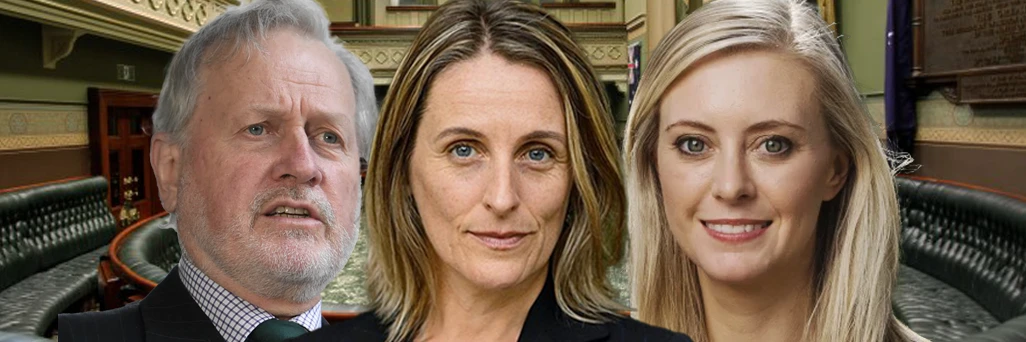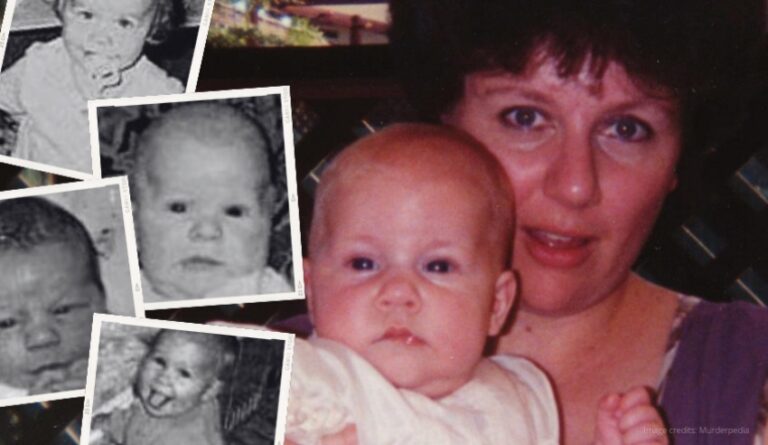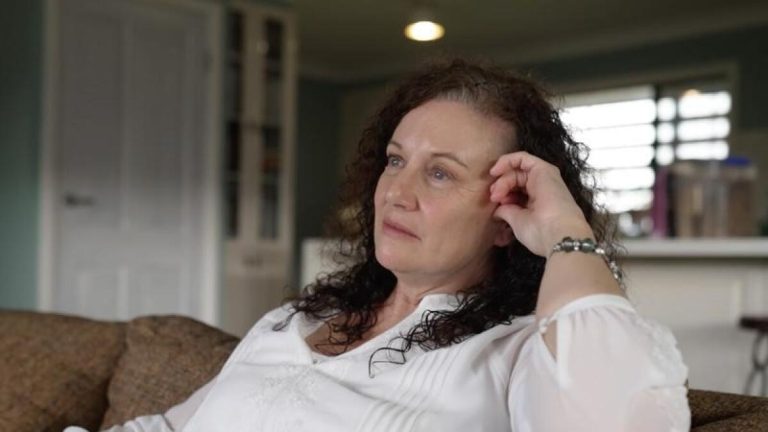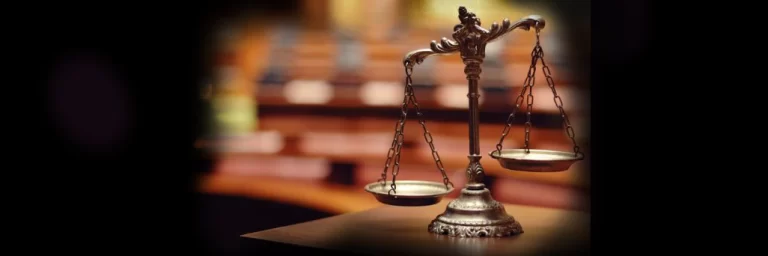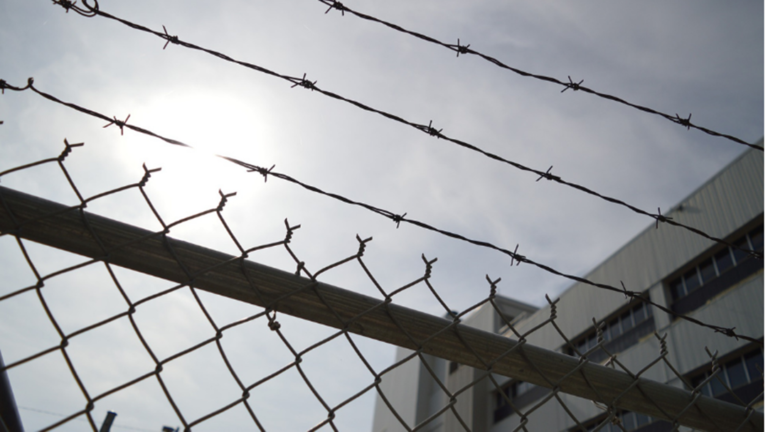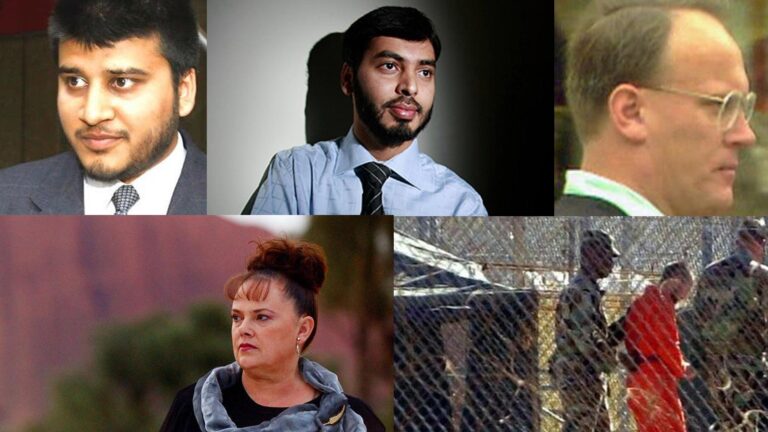Motion of Sue Higginson to NSW Parliament
On Wednesday, 31 June, Sue Higginson (Greens Party) made a motion in the Legislative Council of the NSW Parliament.
The speech demonstrated the courage that our legislators require to do their job and seek genuine justice rather than hiding behind politics that allowing other to avoid making real decisions for the benefit of the citizens they represent, even those who reside in prison. In this case, Kathleen Folbigg, who has surely been shown to have been wrongfully convicted.
The motion was supported by Robert Borsak (Shooters, Fishers and Farmers Party), and Emma Hurst (Animal Justice Party).
However, the motion was amended by the government, so that it was altered to simply mean they would take action as soon as practicable, which meant after J. Bathurst AC, KC, had finalised his report. The amended motion was passed rather than the motion of Higginson. From the speeches subsequent Higginson’s, it was clear that there is a misunderstanding about the current inquiry, at least among some members. The inquiry is an administrative process, and not a judicial process. As a result, the Attorney General can rightfully provide the mechanism for a pardon pending the finality of the inquiry, and steps that will later follow. This does not impair justice for the community; it reinforces it.
You can listen to the speech below and/or read the transcript from Hansard.
Sue Higginson Motion, 31 May 2023 - Part 1
Sue Higginson Motion, 31 May 2023 - Part 2
Speech taken from Legislative Council Hansard – 31 May 2023 – Proof
Ms SUE HIGGINSON (16:27): I move:
(1) That this House notes that:
(a) in 2003, Kathleen Folbigg was convicted for the murder of three of her children and the manslaughter of her firstborn child;
(b) Kathleen Folbigg was sentenced to 40 years in prison, which was later reduced on appeal to 30 years with a 25-year non-parole period;
(c) Kathleen Folbigg has always maintained her innocence;
(d) earlier this month the 2022 Inquiry into the convictions of Kathleen Megan Folbigg heard from Counsel Assisting the Inquirer and the Director of Public Prosecutions that in light of the evidence heard at the inquiry, there is reasonable doubt in respect of Ms Folbigg’s convictions, meaning she was wrongly convicted;
(e) this week marks the grim anniversary of 20 years since Ms Folbigg was sent to prison;
(f) Ms Folbigg has suffered in the hands of the State in the New South Wales prison system, having been abused and bashed while held inside;
(g) despite the clear and consistent evidence of reasonable doubt in relation to Ms Folbigg’s guilt, she is still held in a maximum-security prison; and
(h) holding Ms Folbigg for even a day longer is a compounding of the worst of injustices.
(2) That this House acknowledges:
(a) the work of Ms Folbigg’s friends and supporters who have tirelessly campaigned for her release and supported Ms Folbigg for two decades; and
(b) the many women who struggle for justice under a system that too often fails them.
(3) That this House calls on the Government to:
(a) issue advice to the Governor to pardon Ms Folbigg immediately; and
(b) ensure Ms Folbigg is released without delay.
This motion asks the House to call on the Government to do justice, and to issue advice to the Governor to pardon Kathleen Folbigg immediately and ensure that she is released without delay. It is about acting in the face of the gravest injustice. Kathleen Folbigg is in prison in New South Wales right now, and she should not be. The person who has the power to change that is the Attorney General. Kathleen Folbigg was convicted after being found guilty of charges resulting from the deaths of her four children, which occurred one at a time over 10 years when they were all just babies. Kathleen was sentenced to imprisonment for 40 years, which was reduced on appeal to 30 years with a 25-year non‑parole period. She has served 20 years of that sentence.
The legal system is about evidence. A recent inquiry demonstrated that there are natural causes of death for each child, and Kathleen’s diaries, which were used against her, are not confessions of murder. That is the view taken by the three counsels assisting the judge. The Director of Public Prosecutions has also confirmed that position. There is now a mountain of evidence that was not presented in the trial of Kathleen Folbigg, nor in subsequent inquiries, that shows there is reasonable doubt as to her guilt and her conviction. I am moving this motion because the Attorney General, as the first law officer of this State, has the power to free Kathleen Folbigg. It is important to understand the inquiry into Kathleen Folbigg’s conviction is a separate process than the one available to the Attorney General. The Attorney General’s power to do the right thing is not at all contingent on the written document that will come at the end of an inquiry. The inquiry was ordered by the former Attorney General, Mark Speakman, after he received a petition requesting a pardon from Kathleen’s legal team. The inquiry is Mr Speakman’s inquiry; it is not Kathleen Folbigg’s. She asked for a pardon and is still asking now, and this House must join that call.
The evidence heard at the recent inquiry supports, in no uncertain terms, the position that Kathleen Folbigg has always maintained—that she was wrongfully convicted in 2003. The Attorney General does not need to wait—and nor should he wait—for the written document from the inquiry. It could take the inquiry days, weeks or months to publish the final document. That is how that part of the system works. Written work cannot be rushed. It takes time. It can take weeks and months for all sorts of legitimate reasons. In 2003 Kathleen was convicted after a trial that relied on coincidence and tendency, and it was strongly influenced by a since-discredited Meadow’s law—a precept espoused by a controversial paediatrician, Roy Meadow, suggesting that three or more sudden infant deaths in one family was murder until proven otherwise.
The G114R variant in the CALM2 gene, which is predicted to cause lethal cardiac arrhythmias, was found in Ms Folbigg and her two baby daughters. In 2021 a senior paediatric neurologist concluded that Kathleen’s baby son likely died of an epileptic seizure. The death of her first baby, Caleb, was always diagnosed as sudden infant death syndrome. He was just 19 days old, and it has been well documented that he was a very unwell baby. We now have compelling psychiatric evidence providing much more honest, unbiased and realistic views of Kathleen’s diaries, state of mind and grief at the time. Counsel assisting the inquiry, Sophie Callan, said the overwhelming weight of evidence suggests that Ms Folbigg was a loving and caring mother towards her children. As the judge himself said in the inquiry, there is now a significant body of evidence to suggest reasonable possibilities of identifiable natural causes of death that were not available at the trial.
The Government’s Attorney General has the power to act now. He is the only person who is currently keeping Kathleen in prison wrongly. When legal power is vested in someone, they exercise it. It is wrong in all of the circumstances for the Attorney General not to exercise his power right now. Every minute he delays the administration of justice for Kathleen, he offends the very notion of the rule of law. Kathleen is a woman, like Lindy Chamberlain, who has been failed by the criminal justice system. We cannot undo the past 20 years for Kathleen, but we can act here and now. I ask that all members support this motion for Kathleen, for all women and for the people of New South Wales.
The Hon. ROBERT BORSAK (16:32): I add my voice to advocate for the parole or pardon of Kathleen Folbigg, a woman who has spent two decades in jail. The case of Kathleen Folbigg is one that has raised serious doubts and concerns, and it is our duty to ensure that justice is served. We understand that, from the beginning, Kathleen has maintained her innocence and, over the years, scientific evidence has emerged that supports her claims. Recent research has shed new light on the genetics of her family and of her husband suggesting that there may have been alternative explanations for the tragic deaths of her children. The initial guilty verdict was largely based on diary entries that were interpreted as admissions of guilt. However, there were significant issues with how this evidence was treated during the trial. The focus on these diary entries overshadowed the emerging scientific evidence that could have provided a different perspective on the case.
In recent years extensive scientific research has been conducted revealing the presence of genetic variants that could have contributed to the deaths of Kathleen’s children. The findings suggested the possibility of natural causes for these tragic losses. Prominent scientists and medical professionals have voiced their support for Kathleen, stating that there is a strong presumption that her children died of natural causes. Furthermore, the trial relied on the discredited Meadow’s law, which suggests that multiple sudden infant deaths in one family are evidence of murder. Similar cases in other jurisdictions, such as the United Kingdom, have been overturned due to the flawed reasoning behind this law.
It is crucial to recognise that justice should not only be about punishment but should also be about truth and fairness. Kathleen Folbigg has endured unimaginable grief and suffering as a mother who has lost her children. She has spent two decades in maximum security prisons, largely in confinement for her own safety. I urge all in this place to consider the growing scientific evidence and the bleedingly obvious—that Kathleen Folbigg may have been wrongfully convicted. The Director of Public Prosecutions has said it is open for Mr Bathurst to find reasonable doubt. This is a huge moment. No longer does this State’s top prosecutor maintain that Kathleen Folbigg is guilty. It is time for the Attorney General to act. Has he called Tom Bathurst, KC, to see when the report will be handed down?
I think it is appropriate to draw the comparison to the Lindy Chamberlain case. The counsel assisting with the inquiry and the Director of Public Prosecutions said there is reasonable doubt—yes, reasonable doubt. This was Kathleen Folbigg’s matinee jacket moment. Lindy was released with a pardon within a week; Kathleen Folbigg remains in jail. Granting Kathleen her parole or a pardon would not only acknowledge the potential miscarriage of justice but also allow her to reclaim her life and begin to heal from the immense pain she has endured. No-one needs to be reminded that our justice system should be guided by truth, reason and compassion. It is our duty to ensure that Kathleen Folbigg receives a fair and just outcome as soon as possible.
The Hon. DANIEL MOOKHEY (Treasurer) (16:35): I move:
That the question be amended as follows:
(1) In paragraph (1) (d) omit “and the Director of Public Prosecutions” and “meaning she was wrongly convicted“.
(2) In paragraph (1) (e) omit “grim“.
(3) In paragraph (1) (f) omit ” in the hands of the State” and “having been abused and bashed while held inside“.
(4) Omit paragraphs (1) (g) and (1) (h).
(5) In paragraph (2) (a) omit “the work of Ms Folbigg’s friends and supporters who” and insert instead “that a group of Ms Folbigg’s friends and supporters“
(6) Omit paragraph (2) (b) and insert instead: (b) challenges faced by women in the justice system
(7) Omit paragraph (3) and insert instead: (3)That this House calls on the Government to act in this matter appropriately as soon as practicable.
I represent the Attorney General in this place and will therefore be representing the Government in this debate. I want to acknowledge the presence in the gallery of persons associated with Kathleen Folbigg. The Government is supportive of a constructive discussion with respect to the Kathleen Folbigg matter. The Government is willing to support this motion in an amended form. I am advised that the following matter is incredibly serious. In 2003 Ms Folbigg was convicted of the manslaughter of her first child, Caleb, and the murders of her first three children, Patrick, Sarah and Laura, and of maliciously inflicting grievous bodily harm on Patrick. Ms Folbigg was initially sentenced to 40 years imprisonment with a non-parole period of 30 years. On appeal this was reduced to 30 years with a non-parole period of 25 years. Ms Folbigg has maintained her innocence claiming the four children died of natural causes.
The Government acknowledges that there is significant community interest in this case. Legal and scientific discourse has been extensive and there are significant evidentiary complexities connected with this matter. The Government is pleased with the progress of the most recent inquiry conducted by the Hon. Thomas Bathurst, KC. In respect of the motion, I acknowledge the member who moved it and thank her for raising the matter in this place. It is clear that the Government has an imperative to act with care and diligence in this matter given the gravity of the circumstances.
In May 2022 the former Attorney General recommended the Governor establish a detailed inquiry process upon which this matter could be considered. The Government is supportive of that course of action. The Folbigg matter has been subject to extensive judicial consideration. In 2005 Ms Folbigg appealed her convictions to the Court of Criminal Appeal. The appeal was dismissed. She made an application for special leave to appeal the decision in the High Court of Australia, which was also dismissed. In 2007 Ms Folbigg was granted leave to reopen her appeal in the court of criminal appeal and that the appeal was also dismissed.
I seek leave to speak for an additional two minutes.
Leave granted.
The Hon. DANIEL MOOKHEY: I thank the House. In 2007 Ms Folbigg was granted leave to reopen her appeal in the Court of Criminal Appeal and that appeal was dismissed. In February 2021 Ms Folbigg applied to the Court of Appeal for judicial review of the findings in the first judicial inquiry regarding her case, seeking to have the report quashed or the findings in the report declared legally flawed. The court dismissed the application. It would not be prudent for the Attorney General to make a determination with respect to the Folbigg case in advance of receiving advice or findings from the inquiry, given the previous extensive judicial consideration and the breadth of technical, scientific and legal evidence being considered.
The Government amendments to the motion reflect that position. However, the Government acknowledges that there is a need for urgency. We wish to ensure that our amendments reflect the significance of this matter and provide assurance to all affected parties that the Government has heard and is listening to the calls for action, and will work to make a determination on Ms Folbigg’s applications as soon as is practicable. The proper administration of justice is a central belief of the New South Wales Government. The Attorney General will ensure that significant matters are dealt with, with proper diligence and proper consideration. We all agree that the rule of law is the bedrock foundation of our democratic system of government and must be upheld. To do so, we need to carefully and thoroughly consider the evidence and findings. Once received, the Attorney General and the Government will consider them promptly.
The Hon. ROD ROBERTS (16:40): On behalf of One Nation I indicate that we will not support the motion moved by Ms Sue Higginson. However, if the Government amendments are carried, we will support the amended motion. In 2003 Kathleen Folbigg was convicted of the murder of three of her children and the manslaughter of a fourth child. She was subsequently sentenced to 40 years’ imprisonment. Folbigg exercised her right of appeal. The conviction stood by her sentence. It was reduced, though, to 30 years with 25 years’ non‑parole period.
In 2019, following the petitioning by the legal representatives of Mrs Folbigg, His Honour Reg Blanch, AM, KC, conducted an inquiry into the convictions. In his report, his Honour said, “the investigations of the inquiry have produced evidence which reinforces Ms Folbigg’s guilt” and that he does not have “any reasonable doubt as to the guilt of Kathleen Megan Folbigg for the offences of which she was convicted”. During the Blanch inquiry, Folbigg was represented by senior counsel and the inquiry heard expert evidence about advances in forensic pathology, genetics, neurology, immunology and the understanding of sudden infant death syndrome since her trial in 2003. The inquiry heard from 16 expert witnesses. His Honour Judge Blanch, as indicated previously, could form no reasonable doubt as to the guilt of Folbigg.
Fast‑forward to today and we have yet another inquiry, this time conducted by former Chief Justice Tom Bathurst. This inquiry has heard from a number of experts. Those experts have told the inquiry that Folbigg’s daughters “may” have died as a result of a genetic mutation that “may” have caused cardiac arrhythmias—irregular heart rhythms—and sudden, unexpected death. But the experts are divided. Dr Dominic Abrams, from the Cardiovascular Genetics Center at Boston Children’s Hospital gave evidence that “whilst a cardiac arrhythmia related to the … [genetic] variant cannot be definitively excluded, I believe the likelihood this was responsible for the deaths of Sarah and Laura is low”. We must remember that none of the evidence taken at the inquiry proves Kathleen Folbigg is innocent of the charges; it merely creates a reasonable doubt.
We have a conflict between the experts, which is not unusual in law. Notwithstanding that, many people—including Ms Higginson—are calling for the Attorney General to advise the Governor to issue a pardon under section 76 of the Crimes (Appeal and Review) Act 2001 or for the Governor to make a parole order under section 160AD of the Crimes (Administration of Sentences) Act 1999. It is fundamentally wrong for the Parliament, via the Executive, to interfere with the judiciary. The rule of law and the separation of powers should be maintained at all times. His Honour Tom Bathurst is a highly experienced jurist, who will produce a thorough report. After taking into account the totality of the evidence rather than snippets reported in the media, the report will be completed, and only then should the Attorney General take the action that may be deemed appropriate. The law and its operation is not a play thing for members of Parliament. Only the judiciary is charged with the responsibility of the application of the law. It should be left unfettered to do its job without interference from the Government. The independence of the judiciary relies on it.
The Hon. EMMA HURST (16:43): On behalf of the Animal Justice Party, I speak in support of the motion. In 2003, Kathleen Folbigg was convicted of three counts of murder and one count of manslaughter as a result of the death of her four infant children: Caleb, Patrick, Sarah and Laura. She is currently serving a 30‑year sentence in a maximum-security prison. Despite decades of incarceration and intense public condemnation, Kathleen Folbigg has always maintained her innocence. Since 2021, more than 150 scientists have signed a petition calling for Ms Folbigg’s release, which led to a 2022 judicial inquiry. It has been found that two of Ms Folbigg’s daughters had a variant of the CALM2 gene, which often causes life-threatening cardiac arrhythmias, and her two boys carried a variant of a gene called BSN, which is associated with severe epilepsy and neurodevelopmental delay. In other words, it is likely that the children died of natural causes.
Counsel assisting the inquiry and the Director of Public Prosecutions both concluded that, based on the new evidence received, there is reasonable doubt about Kathleen Folbigg’s conviction, meaning her conviction is no longer valid. A criminal case has to be proved beyond reasonable doubt. In light of the new evidence, that simply has not been met. It is devastating to think that someone could lose four children and be sent to jail for murder while innocent. No wrongfully convicted person should remain in our prisons. It is an enormous miscarriage of justice and one that should be rectified as soon as possible. While Ms Folbigg could potentially be pardoned or released via an inquiry process, there is significant uncertainty about how soon that can happen and reports say that Ms Folbigg is not coping in incarceration. That is why we support the motion that calls on the Government—more specifically, the Attorney General—to issue advice to the Governor to pardon Kathleen Folbigg immediately. I also thank Ms Sue Higginson for bringing this important matter to the House and for her work advocating for women who have been failed by the criminal justice system. I commend the motion to the House.
The Hon. BRONNIE TAYLOR (16:45): I speak on the motion before the House and also thank Ms Sue Higginson for moving the motion and for her advocacy today. The legal complications and challenges of this motion have been mentioned a lot. We have a lot of lawyers in this House, and I will leave that to them because I do not have a law degree. I commend some people who are in the gallery today. Tracy Chapman is Kathleen’s lifelong friend and staunch advocate. What has done for her friend is admirable and courageous. I respect what she has done and I take my hat off to her. She is an amazing human being and it has been an absolute privilege to meet her today. Kathleen’s lawyer, Rhanee Rego, is also in the gallery. She has worked for Kathleen for six years pro bono. That means a lot. I offer my congratulations to her. It is amazing be talented enough to have a law degree and to use that for the forces of good.
A lot has changed in 20 years not just in technology and science but also in our approach to mental health and the treatment of women. Advances in science have allowed the legal system to understand precise natural causes of death for the Folbigg children. The new scientific evidence is vitally important, but it is only one part of the story. At the 2003 trial a handful of words were cherrypicked from the more than 50,000 words Kathleen Folbigg had written in her diaries over 10 years. No expert witnesses appearing at the trial had analysed those diaries. The recent inquiry had 10 experts, which included three independent psychiatrists and psychologists engaged by the inquiry, to review those diaries. They all shared the view that those diaries are not confessions of murder.
As Sophie Callan, SC, the lead counsel assisting the inquiry, said in written submissions, “the weight of the evidence tends to suggest that Ms Folbigg was in general, a loving and caring mother towards her children”. At that inquiry, counsel assisting and the Director of Public Prosecutions both agreed that there is reasonable doubt about Kathleen Folbigg’s convictions. As a society, we have come a long way in understanding mental health, post-traumatic stress disorder, maternal grief, trauma and depression. Those once stigmatised topics were not discussed much two decades ago; they were certainly not discussed as openly as they are now. It is important that we reflect on this long case and that we look at the treatment of this grieving mother. She did not cry openly; therefore, in the public’s eye, she must be guilty? But we now know that trauma affects everybody differently. Not showing overt or public signs of grief does not mean someone does not feel the same loss as another person. It simply means that we all grieve differently. Kathleen Folbigg was grieving for the loss of her four babies.
I seek an extension of 30 seconds.
Leave granted.
The Hon. BRONNIE TAYLOR: I thank the House for its indulgence. I respect that the Attorney General has decided to wait for the report of Tom Bathurst, KC. But I urge the Attorney General to act immediately when he receives the report to pardon Kathleen Folbigg because every day in prison is a day too long. I give a big shout‑out to the amazing Brigid Glanville, who is here today. Her history does not need any exaggeration from me, but her pro bono advocacy in this case should be commended.
The Hon. STEPHEN LAWRENCE (16:49): I speak in support of the amendment and the Government’s position on the motion. I can hardly underestimate the significance of this issue. In my opinion, it is the most significant development in the criminal justice system in New South Wales in living memory. The horror of what we are dealing with can scarcely be understated: the horror of the death of four children; the horror of the prospect of the murder or manslaughter of children; the prospect of the death of four children by natural causes; and, perhaps most importantly, in light of the concessions that have been made at the inquiry, the prospect of a person losing four children and then being wrongly convicted of the intentional homicide of those children. It is perhaps those horrors that make this case quite difficult to engage with on a human level, but it must be engaged with.
The ancient powers that exist now, in part in statute, to parole or pardon are aspects of the prerogative of mercy. They are important powers, and the Chamberlain case shows how crucial it is that the repository of those powers always stand ready to exercise them. It is relevant to recall that Lindy Chamberlain was released on licence or parole prior to the second royal commission and prior to her ultimate pardoning and acquittal. It is relevant to note, too, that Tom Bathurst is not sitting in this inquiry as a member of the judicial arm of government. He is sitting as a member of the administrative arm. It is relevant to note that in the inquiry Tom Bathurst had cause to mention that these powers were independent of the powers that he exercises. It is important to reflect on the role of the Director of Public Prosecutions [DPP] and counsel assisting.
I played the role of counsel assisting in a number of coronial inquiries. The person playing that special role confers with the inquirer on a regular basis. They plan lines of questioning and they help to write the judgement. Of course, the DPP plays the role of contradictor in those proceedings, in a sense, but it is the prosecutor in an adversarial system of criminal justice. The significance of the DPP concession in that inquiry can hardly be overstated. It would be the contradictor in any future appeal proceedings. So what can we ask of the Attorney General? Well, we certainly cannot put undue pressure on him or prejudge those decisions that are his to make. All I would suggest we can ask of the Attorney General is that he is ready to exercise his powers at any time, that he does not delegate the exercise of his powers constructively to any other person, and that he stands ready as the repository of those powers to give mercy, if mercy is warranted, upon the engagement with the issues, facts and evidence. [Time expired.]
The Hon. NATALIE WARD (16:52): I speak on behalf of the Opposition. I thank Ms Sue Higginson for bringing the motion before the House. I know she does so with great intent and diligence. I acknowledge the supporters of Kathleen Folbigg in the President’s gallery and their relentless, tireless devotion to their friend. I also acknowledge the loss of those precious children. The loss of children in any circumstance is devastating. I know that all members come to this place with genuine intent to see the right thing done. I mourn for those children, for their mother and for their family.
I indicate that I am aware of the Government’s proposed amendments to the motion. At the outset, I indicate that the Opposition will be supportive of those amendments and, should they be successful, of the amended motion. I put on record a couple of things, given that the matter came before the previous Government and the previous Attorney General, who is now Leader of the Opposition. The Opposition believes in the rule of law and the right to due process within the criminal justice system in New South Wales and across Australia. It is a foundation of our democracy. As an inquiry is underway, I am hesitant to comment directly on the specific components of it. As the Hon. Bronnie Taylor said, there are too many lawyers in this place as it is, so I will leave it to them—I merely hold a practising certificate.
The Opposition is aware of the immediate coverage surrounding the inquiry. I note that the previous Government instigated the inquiry as its members believed the case should be seen through. In May 2022, when the then Attorney General recommended that the Governor appoint retired Chief Justice the Hon. Tom Bathurst, AC, KC, to conduct a second inquiry into Ms Folbigg’s conviction, we did so in the belief of that process coming to a view, and that a transparent, public and fair process can provide a just resolution. I seek an extension of time.
Leave granted.
The Hon. NATALIE WARD: As the then Attorney General indicated at the time, Ms Folbigg’s legal representatives contended that the new scientific evidence was compelling. I am advised that the 2021 petition raised new scientific material, published since the first inquiry into the convictions. We note that the new material concerns developments in the scientific understanding—forgive my explanation—of the CALM2 genetic variant found in Ms Folbigg and her two daughters, Sarah and Laura. The new scientific material predicts that the CALM2 genetic variant in question causes disease and that carriers of it are prone to cardiac arrhythmias, which can cause cardiac arrest during sleep.
The new scientific material and the implications it has for Ms Folbigg’s case are complex and must be carefully and thoroughly scrutinised by appropriately qualified experts and investigated in the context of her case. But we know that she has been unsuccessful in numerous public proceedings to date. There is a need for fairness and transparency in that process. Against that backdrop, the then Attorney General explained that it would not be appropriate for the Governor to grant a pardon or, for example, for the Governor or Attorney General to receive private briefings from experts with a view to considering granting a pardon without that evidence being properly scrutinised independently and in a public forum. At the conclusion of Mr Bathurst’s inquiry, a report will be prepared and the outcome of that will be a matter for the judicial officer—in this case, Mr Bathurst.
The Crimes (Appeal and Review) Act sets out the actions that may be taken on completion of an inquiry, and they involve a review of conviction under the Crimes (Appeal and Review) Act. If the judicial officer who conducts the inquiry finds there to be no reasonable doubt as to the convicted person’s guilt, then a report will be provided to the Governor and the Governor may then dispose of the matter by taking no further action. If the judicial officer who conducts the inquiry finds there is reasonable doubt as to the convicted person’s guilt, then the judicial officer can refer the matter to the Court of Criminal Appeal. That court, in considering a report received by it from the inquiry, has the power to quash that conviction and grant the convicted person an acquittal. In either case, the Governor can grant a convicted person a free pardon.
A free pardon has the effect of relieving a convicted person of the consequences of their conviction, so they would not be required to serve any remaining time on their sentence. However, that does not mean the conviction is quashed. If there has been an inquiry, then a convicted person who has been granted a free pardon can apply to the Court of Criminal Appeal for it to be quashed. Nonetheless, guilt, innocence and the matter of custodial sentences are extremely serious matters. We support the view of the new Government to look at this matter very closely and consider whether there is something it can do more urgently than that process, given appropriate advice. In circumstances where the Government is being called on to act appropriately and as soon as practicable, if those amendments are successful then we will absolutely support them and support the amended motion.
Ms SUE HIGGINSON (16:58): In reply: I thank the Hon. Robert Borsak in particular for his contribution. I thank the Hon. Daniel Mookhey, the Hon. Rod Roberts, the Hon. Emma Hurst and the Hon. Bronnie Taylor. I thank The Hon. Stephen Lawrence for that incredible insight into the role of counsel assisting an inquiry and the role of an inquiry. I thank the Hon. Natalie Ward for her contribution. The conflation of what is happening here astounds me. It is not a judicial inquiry that is being undertaken; it is an administrative function. It is a completely separate process to the plea and the petition and what Kathleen Folbigg’s legal team has been asking for. They are asking for a pardon and immediate release.
The Attorney General has the power; he is the leading law officer of this State. He is the only person who stands between justice and the gravest injustice we know of in a rule of law system—a democracy; a functioning system. We are talking about the wrongful incarceration of a 55-year-old woman who has spent 20 years in prison and is now going to spend more time in prison. The Attorney General has the power to look at the volume of evidence. After reading every single word, going through every volume and looking at every transcript, it is very difficult to sleep at night knowing that she is still in prison. I have read every single word. I am a lawyer. Every single member in this House should support the motion unamended. The Greens will accept and work with the fact that even though the motion will be amended, it still provides some serious leverage. We will not stop our pleas directly to the Attorney General to do the right thing.
This State deserves an Attorney General who is willing to engage in the law and the systems before him or her, and they should do the right thing by justice. If the Attorney General does not have a justice bone in their body, then they should not be the Attorney General. That is the role of the first legal officer of this State. A woman is in prison and, on the face of all the expertise, she is there in spite of a very basic fundamental legal premise. There is reasonable doubt as to her guilt and her conviction. We are waiting for one more man to put pen to paper to say the very things that have already been said. The Attorney General’s power does not rest on that. Please support the motion unamended.
The ASSISTANT PRESIDENT (The Hon. Peter Primrose): Ms Sue Higginson has moved a motion, to which the Hon. Daniel Mookhey has moved an amendment. The question is the amendment be agreed to.
The House divided.
Ayes31
Noes8
Majority23
AYES | ||
Buttigieg | Latham | Munro |
Carter | Lawrence | Murphy |
D’Adam | MacDonald | Nanva (teller) |
Donnelly | Maclaren-Jones | Rath (teller) |
Fang | Martin | Roberts |
Farlow | Merton | Sharpe |
Farraway | Mihailuk | Suvaal |
Graham | Mitchell | Taylor |
Houssos | Mookhey | Tudehope |
Jackson | Moriarty | Ward |
Kaine |
|
|
NOES | ||
Banasiak | Cohn | Hurst |
Borsak (teller) | Faehrmann (teller) | Ruddick |
Boyd | Higginson |
|
Amendment agreed to.
The ASSISTANT PRESIDENT (The Hon. Peter Primrose): The question now is that the motion as amended be agreed to.
Motion as amended agreed to.
